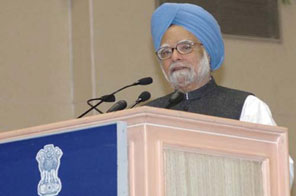Worst is over for food inflation: Indian PM
NEW DELHI: Indian Prime Minister Manmohan Singh, under attack over rising food prices, said Saturday the worst of the country's food price inflation was over and that there was no need for panic over supplies.
The weakest monsoon rains in nearly four decades affected harvests last year, sending food prices rocketing, with the cost of some staples doubling from a year earlier, causing major hardship for India's poor masses.
Singh's assurances came days after new figures showed food inflation accelerated for a second week to hit 17.56 percent from a year earlier after moderating for several weeks.
Inflation, which hit a decade high of nearly 20 percent in December driven by soaring prices of pulses, vegetables and sugar, has given a political boost to opposition parties, which have accused the government of incompetence.
"I am confident we will soon be able to stabilise food prices," Singh told a meeting of state chief ministers in New Delhi, noting the outlook for farm output was more optimistic than original estimates.
Post-monsoon rains had been good, boosting the chances of a better winter harvest, the Congress premier added.
"The worst is over as far as food inflation is concerned" and there are sufficient food stocks, Singh said.
At the same time, he called for a "complete overhaul" of India's "hopelessly outdated" public distribution system, which is meant to sell subsidised food to the poor but according to critics has left millions hungry.
Singh also said the government needed to boost farm productivity to meet growing demand from India's billion-plus population.
"It is well known that in many food crops, including pulses... large increases in yield per hectare are possible," he told the chief ministers.
The government announced plans to set up a committee of chief ministers to suggest steps to improve the public distribution system and bring down food inflation.
From being a net importer of food in the 1950s, India achieved food grain sufficiency in the 1970s thanks to the introduction of new agricultural techniques.
But Singh has warned population growth could undermine that success.
High food inflation has fuelled overall inflation, which some economists predict could hit 10 percent by the end of the fiscal year in March, casting a cloud over the economy's rebound from the global financial crisis.
Singh projected in his speech growth of 7.5 percent for the current fiscal year, compared with 6.7 percent the previous year.
Wrestling down food inflation is a key priority for the Congress-led government, whose electoral backing comes from India's teeming poor -- those most vulnerable to high food prices.
"We are all very concerned about the distress the sharp rise in food prices has caused the common man," Singh said.
Singh's words failed to convince Gujarat Chief Minister Narendra Modi, a member of the opposition Hindu nationalist Bharatiya Janata Party, who accused the government of "helplessness" over food prices.
pmc/njc






